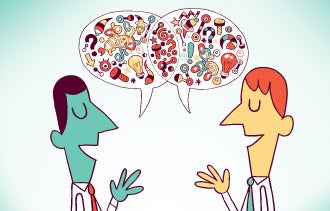5 Business Conversations to Have Today Welcome to the 'We Economy.' It's time for people to navigate change and create a positive work environment where everyone works as a team to achieve goals.
Opinions expressed by Entrepreneur contributors are their own.

Americans for decades have talked about, "Me, me, me." And look at where it got us economically.
The Ego Economy is dead. Welcome to the We Economy.
It's time to check your ego at the door and stop thinking about who or what you can control and manipulate with your business. The We Economy is instead about asking how you can navigate change and create a positive work environment where everyone works as a team to achieve goals.
The U.S. companies emerging as post-recession superstars are the ones that embrace the We Economy versus the old Gordon Gekko-type ways.
Facebook, which recently undertook a historic IPO, continually uses "we" in the description of its company culture:
"We encourage people to be bold. The phrase "this journey is 1% finished' is posted on our walls, reminding us that we've only begun to fulfill our mission to make the world more open and connected."
Related: The Power of Business Imagination
As business owners, we all have a choice. We can get on board the We Economy and embrace this way of thinking as our companies are lifted on waves of profits. Or we can capsize by trying to go it all on our own.
How do you navigate the change and succeed at work? Here are five ways to change the way you think and talk when it comes to doing business:
1. "I did it" becomes "We did it." This is about creating partner relationships with everyone who touches the business: employees, customers/clients, vendors/suppliers and others. It means you ask an employee on the front lines, "How would you build a better business?" And then you listen deeply, tap their wisdom, and quickly implement. You ask customers or clients, "How could we serve you better?" You listen deeply, find themes in what they are saying, and act immediately. Same goes with vendors and suppliers. Ask about best practices they see out there, consult with employees, and then act on what makes sense.
2. "I already know that" becomes "Please show me how." Back when information trickled in through conversations, printed materials and television, business owners were usually right when they said, "I already know that." But now that the Internet and social media have opened up a fire hose of information, we all need to get used to saying, "Please show me how." Be teachable, and have the confidence to hire people who are smarter than you in certain areas -- and tap their brains. In doing so, you can turn your enterprise into your one where you can learn with your employees, finding out those things that are going to make your business more profitable.
3. "I'm a failure" becomes "Let us try again." The recent multibillion-dollar investment loss at J.P. Morgan shows that reputation lacks the ability to insulate one from spectacular setbacks. "I'm a failure," becomes a phrase heard all too often. It used to be a business could build a mystique around itself and go it alone as though it was the Lone Ranger. If your original horse Dusty was killed, who would ever know? But the masks are off in the We Economy. Transparency is the new game with information flowing flat across most industries. Since the masks are off, we see other business leaders and owners for who they are -- people just like us who are finding ways to make a profit in this different economy. Stop worrying about failure, and find some Tontos to help you out. It's time to say, "Let's try again."
Related: How to Hire Positive Employees for Your Business
4. "My business will be better when…" becomes "Let's do what we can today." In the Ego Economy, when business is down, you push responsibility onto outside factors. You say, "Business will better when…I get some new employees" or "…I move to a new location" or "…I renegotiate my supplier contracts" or "…I cut out my distributor and sell direct." In the We Economy, rather than pushing responsible action to a perfect tomorrow, we pursue the practical right now and say, "Let's do what we can today." The We Economy is short on tomorrows. We do what we can right now to grow our business.
5. "I pulled myself up by my own bootstraps" becomes "We wear loafers." In the Ego Economy, we all wore boots and bragged about pulling ourselves up by our own bootstraps. As self-made men and women, we created it all. In the We Economy, we wear loafers. Loafers are actually innovative -- more comfortable, easier to pull on and off, with no socks. In the We Economy, you're comfortable in responding to the changing demands of your partners and learning as you go. You pull your workers onto and off of teams according to project needs, and avoid leaving them in siloed departments. And who needs socks anyway?
Relating with everyone who interacts with your business and creating new learning generates creative innovation. It takes everyone in your company to greater profits and higher margins.
So welcome to the We Economy -- and remember to wear loafers.
Related: How to Tap the Power of 'Thank You'












